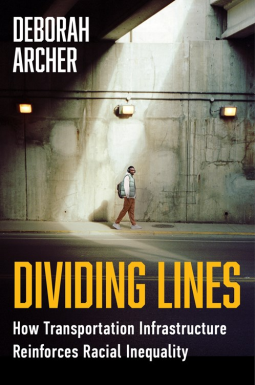
Dividing Lines
How Transportation Infrastructure Reinforces Racial Inequality
by Deborah N. Archer
This title was previously available on NetGalley and is now archived.
Send NetGalley books directly to your Kindle or Kindle app
1
To read on a Kindle or Kindle app, please add kindle@netgalley.com as an approved email address to receive files in your Amazon account. Click here for step-by-step instructions.
2
Also find your Kindle email address within your Amazon account, and enter it here.
Pub Date Apr 15 2025 | Archive Date Mar 31 2025
Talking about this book? Use #DividingLines #NetGalley. More hashtag tips!
Description
From an eminent legal scholar and the president of the ACLU, an essential account of how transportation infrastructure—from highways and roads to sidewalks and buses—became a means of protecting segregation and inequality after the fall of Jim Crow.
Our nation’s transportation system is crumbling: highways are collapsing, roads are pockmarked, and commuter trains are unreliable. But as acclaimed scholar and ACLU president Deborah Archer warns in Dividing Lines, before we can think about rebuilding and repairing, we must consider the role race has played in transportation infrastructure, from the early twentieth century and into the present day.
As Archer demonstrates, the success of the Civil Rights movement and the fall of Jim Crow in the 1960s did not mean the end of segregation. The status quo would not be so easily dismantled. With state-sanctioned racism no longer legal, officials across the country—not just in the South—turned to transportation infrastructure to keep Americans divided. A wealthy white neighborhood could no longer be “protected” by racial covenants and segregated shops, but a multilane road, with no pedestrian crossings, could be built along its border to make it difficult for people from a lower-income community to visit. Highways could not be routed through Black neighborhoods based on the race of their residents, but those neighborhoods’ lower property values?a legacy of racial exclusion?could justify their destruction. A new suburb could not be for “whites only,” but planners could refuse to extend sidewalks from Black communities into white ones.
Drawing on a wealth of sources, including interviews with people who now live in the shadow of highways and other major infrastructure projects, Archer presents a sweeping, national account—from Atlanta and Houston to Indianapolis and New York City—of our persistent divisions. With immense authority, she examines the limits of current Civil Rights laws, which can be used against overtly racist officials but are less effective in addressing deeper, more enduring, structural challenges. But Archer remains hopeful, and in the final count describes what a just system would look like and how we can achieve it.
Advance Praise
"Deborah Archer’s Dividing Lines demonstrates with great clarity that decisions about infrastructure in the United States have been anything but neutral. The placement of roads, bridges, and highways has often been in service of maintaining white supremacy—keeping Black people in their ‘place’ at the lower end of a yawning wealth gap, with fewer educational opportunities and less access to health care, and without the amenities that White communities take for granted. This is a brilliant and persuasive call to action for all who are concerned about creating a more just society." -Annette Gordon-Reed, winner of the Pulitzer Prize and author of On Juneteenth and The Hemingses of Monticello
"Deborah Archer offers an unsparing assessment of how twentieth-century transportation decisions have harmed Black communities, drained Black wealth, and shredded cohesive Black enclaves across the country. It is a quintessential example of how systemic racism affects contemporary Black economic vitality, richly documented and explained by Archer." -Sherrilyn Ifill, former president and director-counsel, NAACP Legal Defense Fund
"In America’s racial accounting, transportation policy has long been overlooked. Until now. In this revelatory book, Deborah Archer shows how racist decision-making has defined and designed the infrastructure—the roads, bridges, even the sidewalks—surrounding us all." -James Forman, Jr., Pulitzer Prize–winning author of Locking Up Our Own
Available Editions
| EDITION | Hardcover |
| ISBN | 9781324092131 |
| PRICE | $29.99 (USD) |
| PAGES | 272 |



